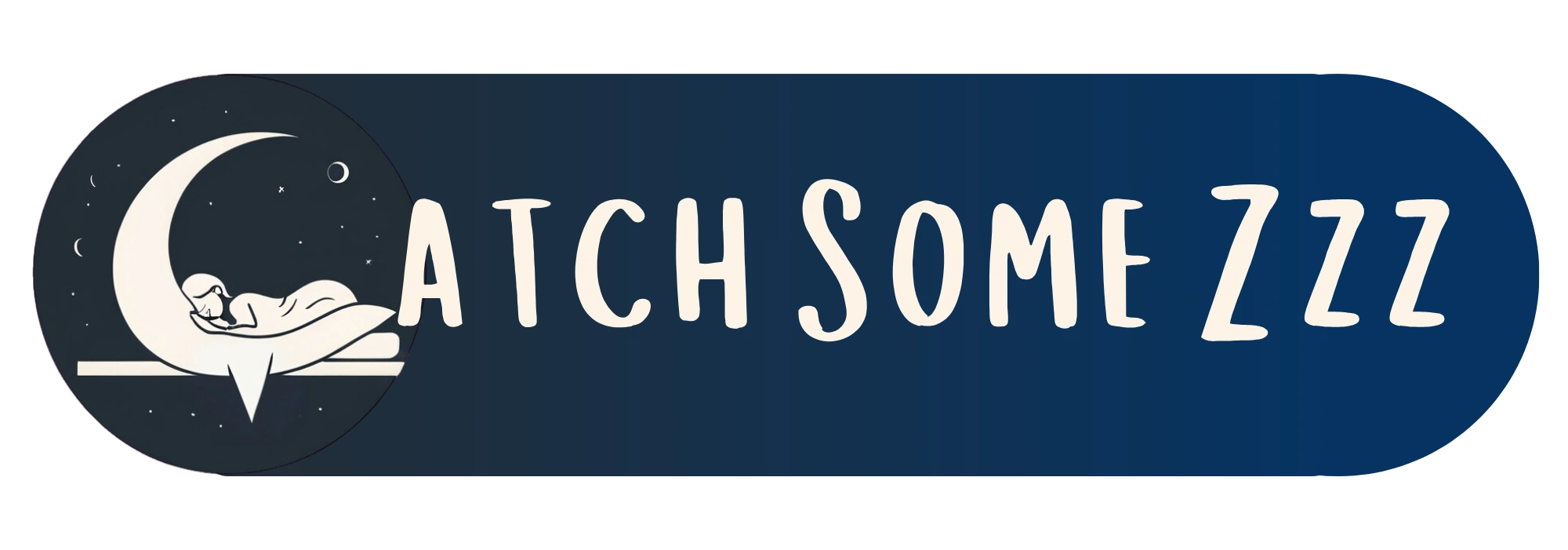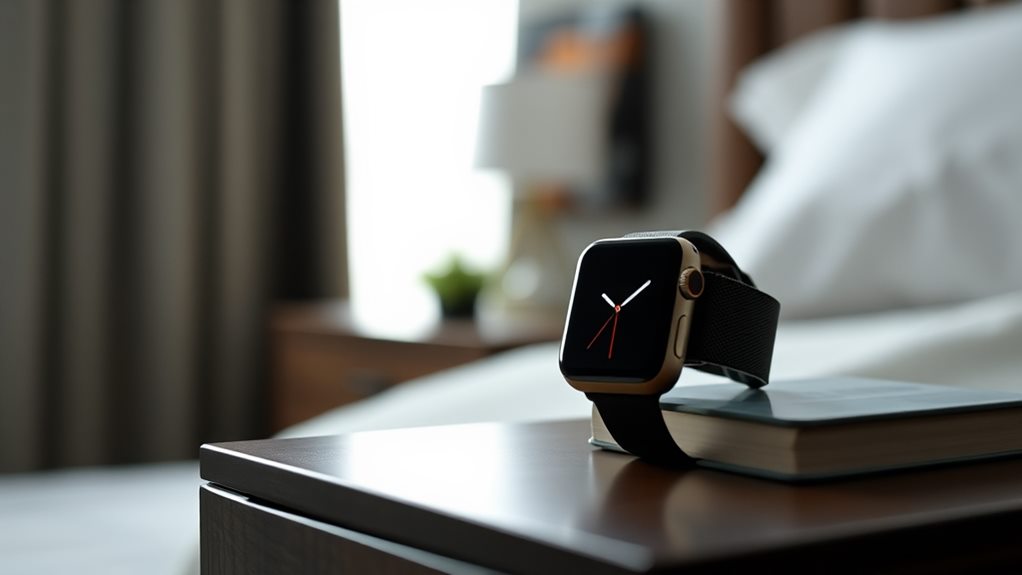You're probably wondering if your Apple Watch needs sleep cycle tracking, and the answer is yes. Native tracking capabilities can only do so much, and if you're struggling with quality sleep, you need more detailed insights. Tracking sleep cycles helps you identify potential issues, fine-tune your sleep schedule, and wake up feeling rested and refreshed. While your Apple Watch can detect sleep patterns, it may not be entirely accurate due to various factors. To access the full potential of sleep tracking, you need to explore more advanced features, and that's where things get really interesting – and helpful.
Nightcap Notes
- Apple Watch's native sleep tracking capabilities have limitations, such as relying on accelerometer data and heart rate variability.
- Third-party sleep tracking apps can provide more detailed analysis and personalized recommendations to fill the gaps in Apple Watch's capabilities.
- Sleep cycle tracking is essential for athletes and individuals struggling with quality sleep to optimize rest and recovery.
- Apple Watch users may benefit from sleep cycle tracking to gain valuable insights into sleep patterns and make informed changes.
- Sleep cycle tracking can improve overall health and wellbeing by identifying issues like lack of deep sleep or environmental disruptions.
What Is Sleep Cycle Tracking
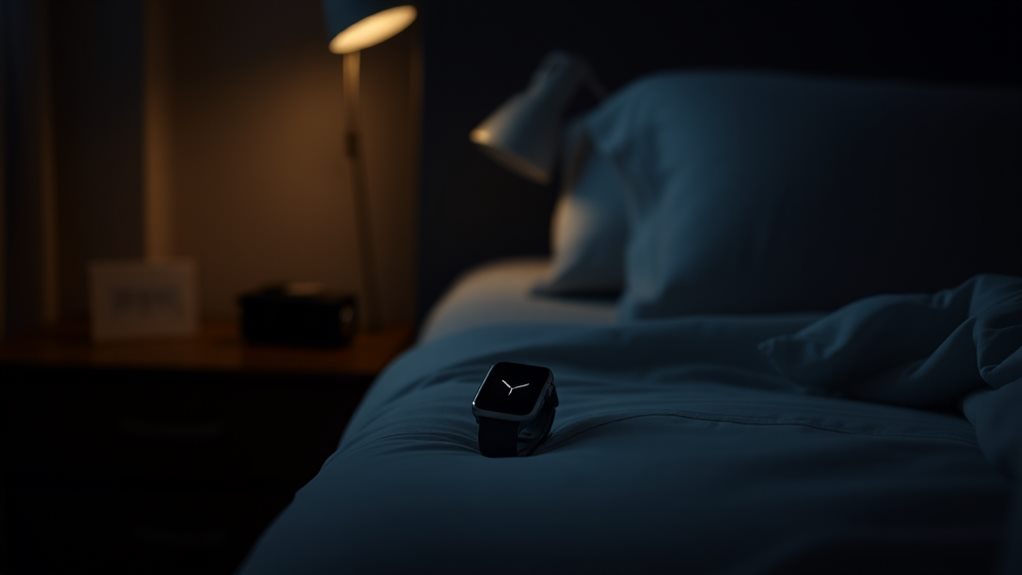
With each passing night, your body goes through multiple sleep cycles, and tracking them can provide valuable insights into the quality of your rest.
You experience different stages of sleep, from light to deep, and even REM (rapid eye movement) sleep, where your brain is active and dreams occur. A full sleep cycle typically lasts around 90-120 minutes, and you go through several cycles per night.
Smart mattress technology unlock deeper sleep can play a vital role in understanding your sleep cycles. Additionally, using devices compatible with this technology can help track your sleep cycles more effectively.
As you sleep, your body is hard at work, repairing and rejuvenating itself.
Your sleep cycles can be influenced by factors such as your sleep environment, physical activity, and even your diet. By tracking your sleep cycles, you can gain a better understanding of your sleep patterns and identify potential issues that may be affecting the quality of your rest.
This information can help you make informed decisions about your sleep habits and develop strategies to improve your overall sleep quality.
You can use devices like the Apple Watch to track your sleep cycles and gain valuable insights into your sleep patterns.
Benefits of Sleep Cycle Tracking
Tracking your sleep cycles isn't just about understanding your sleep patterns – it's also about leveraging that knowledge to improve your overall well-being.
By monitoring your sleep cycles, you'll gain valuable insights into the quality of your sleep, which can help you identify areas for improvement. Many iOS users have turned to unlock better rest with sleep quality monitoring apps, helping them pinpoint the factors that disrupt their sleep and make informed decisions to optimize their sleep environment.
With sleep cycle tracking, you'll be able to fine-tune your sleep schedule, ensuring you wake up feeling rested and refreshed. This, in turn, can boost your energy levels, improve your mood, and enhance your cognitive function.
You'll also be able to set realistic goals and develop strategies to achieve better sleep, such as establishing a consistent bedtime routine or creating a sleep-conducive environment. By taking control of your sleep, you'll be better equipped to tackle the demands of your daily life, making sleep cycle tracking a valuable tool for improving your overall quality of life.
How Sleep Cycles Affect Health
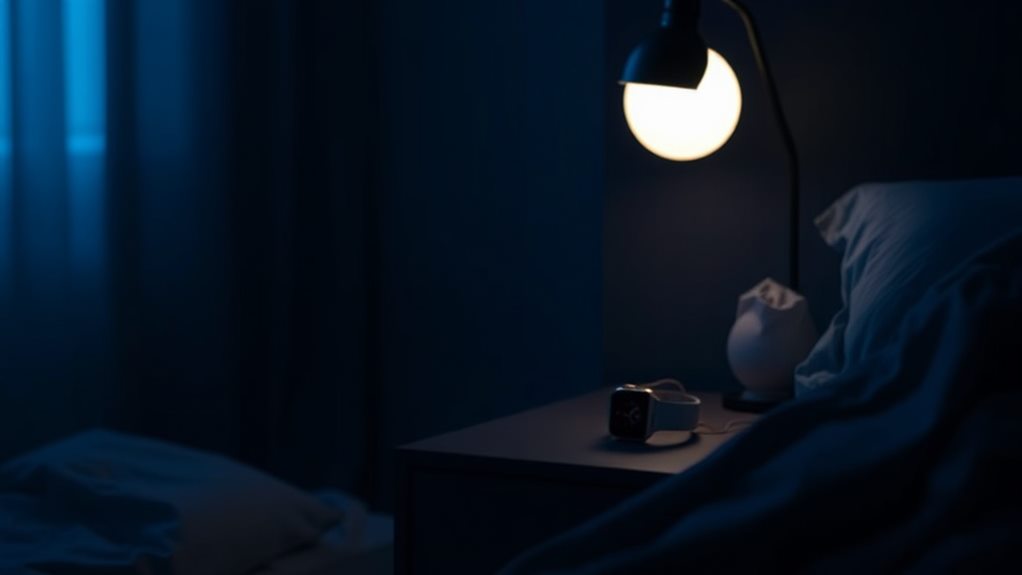
Your body's physical and mental health are closely tied to the quality of your sleep cycles.
When you don't get enough sleep or your sleep cycles are disrupted, you'll feel the effects. You'll be sluggish, irritable, and struggle to focus. But that's not all – poor sleep quality can also lead to chronic diseases like diabetes, high blood pressure, and cardiovascular disease.
To monitor and improve your sleep quality, consider utilizing top smart sleep tracking gadgets. These devices, such as those found in best sleep trackers, can provide valuable insights into your sleep patterns.
Here's how sleep cycles impact your health:
- Impaired cognitive function: Disrupted sleep cycles affect attention, memory, and decision-making skills. You'll struggle to learn new information, and your reaction time will slow down.
- Increased risk of chronic diseases: Poor sleep quality is linked to a higher risk of obesity, type 2 diabetes, and cardiovascular disease. This is because sleep affects hormones that regulate hunger, fullness, and metabolism.
- Mood disorders and mental health: Sleep cycles play a critical role in mental health. Disrupted sleep patterns can lead to depression, anxiety, and mood swings, making it essential to prioritize sleep for overall well-being.
Apple Watch Sleep Tracking Limitations
Sleep cycle tracking is a complex process, and even top-of-the-line devices like the Apple Watch have their limitations.
You may notice that your Apple Watch doesn't always accurately track your sleep patterns, and this is because it relies on accelerometer data and heart rate variability to detect when you're sleeping. While this works reasonably well for detecting when you're awake or asleep, it's not as effective for tracking the different stages of sleep, such as light, deep, and REM sleep.
Additionally, the Apple Watch's sleep tracking capabilities can be disrupted by various factors, such as a restless partner, a pet that sleeps on your bed, or even your own midnight trips to the bathroom.
Moreover, if you have a job that involves a lot of physical activity or irregular schedules, the Apple Watch's algorithms may struggle to accurately detect your sleep patterns. These limitations can affect the accuracy of the data, which in turn can impact the usefulness of the insights and recommendations provided by the Apple Watch.
As a result, you should be aware of these limitations when using your Apple Watch to track your sleep.
Third-Party Sleep Tracking Apps
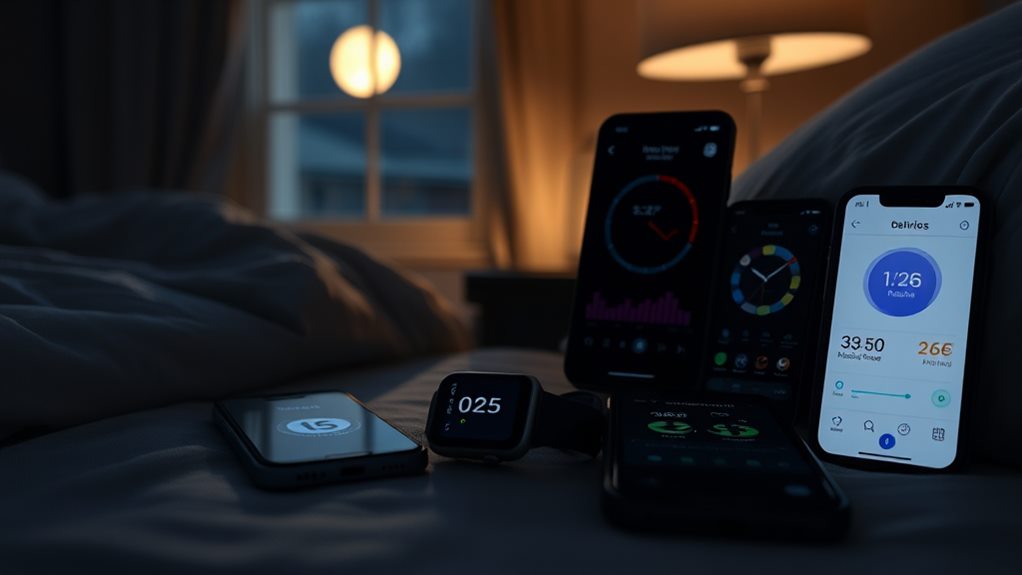
Utilizing third-party sleep tracking apps can help fill the gaps in the Apple Watch's native sleep tracking capabilities.
You can find a wide range of apps that offer more detailed sleep analysis, personalized recommendations, and additional features to enhance your sleep experience.
By leveraging these apps, you can gain a deeper understanding of your sleep patterns and make data-driven decisions to improve the quality of your rest.
Some popular third-party sleep tracking apps for Apple Watch include:
- Sleep Cycle: This app tracks your sleep patterns and wakes you up during your lightest sleep phase, helping you feel rested and refreshed.
- Pillow: Pillow offers advanced sleep tracking features, including sleep stage tracking, sleep debt calculation, and personalized recommendations for improvement.
- AutoSleep: AutoSleep provides detailed sleep analysis, including sleep duration, sleep quality, and sleep stage tracking, as well as customizable alerts and reminders.
Features to Look for in Apps
When evaluating third-party sleep tracking apps for your Apple Watch, it's key to weigh the features that matter most to your sleep goals.
You'll want an app that tracks not only your sleep duration but also your sleep stages, such as light, deep, and REM sleep. Look for apps that provide detailed sleep stage tracking, as this will give you a better understanding of your sleep quality.
Another important feature to ponder is the app's ability to track your sleep patterns over time.
This will help you identify trends and patterns in your sleep, allowing you to make data-driven decisions to improve your sleep hygiene. You may also want to ponder apps that offer customizable sleep goals, allowing you to set specific targets for your sleep duration, sleep stages, and sleep quality.
Accuracy of Sleep Cycle Tracking
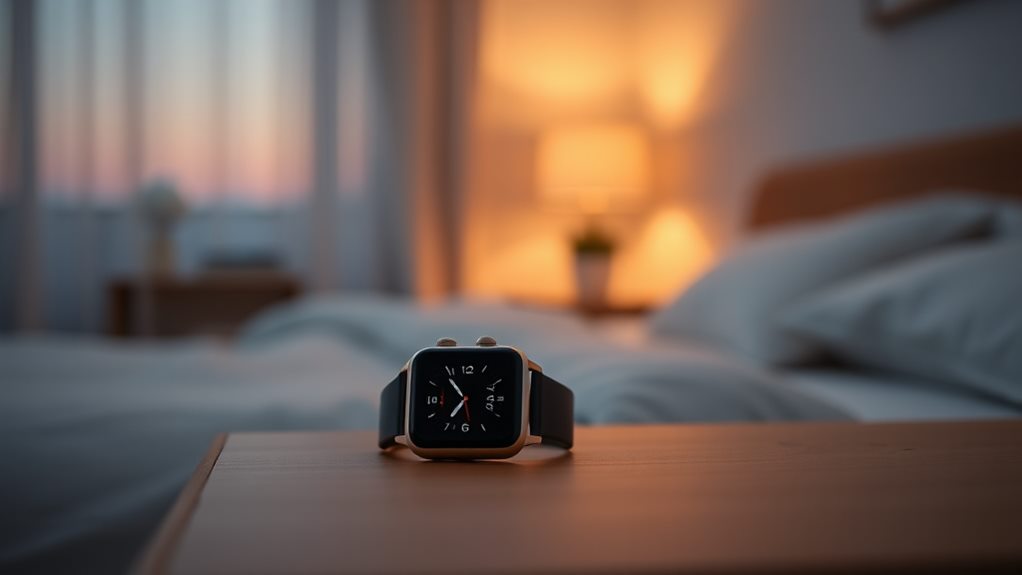
Many factors can impact the accuracy of your Apple Watch's sleep cycle tracking, so it's crucial to understand how these elements affect the reliability of your sleep data.
Your Apple Watch relies on a combination of accelerometer and heart rate data to track your sleep patterns.
However, various factors can influence the accuracy of this data.
You need to be aware of the following factors that can affect the accuracy of your sleep cycle tracking:
- Sleep position: If you sleep with your watch hand under your body or in an unusual position, it may not accurately track your movements.
- Sleep environment: An unstable or moving sleep environment, such as a boat or a car, can affect the accuracy of your sleep data.
- Other health conditions: Certain health conditions, such as sleep apnea or restless leg syndrome, can impact the accuracy of your sleep cycle tracking.
Tips for Better Sleep Cycles
Several strategies can help you improve the quality of your sleep cycles.
You can start by establishing a consistent sleep schedule, going to bed and waking up at the same time every day, including weekends. This helps regulate your body's internal clock and can improve the quality of your sleep.
You should also create a bedtime routine to signal to your body that it's time to sleep. This can include activities like reading a book, taking a warm bath, or practicing relaxation techniques like deep breathing or meditation.
You can also improve your sleep environment by making your bedroom a sleep haven. This means keeping your bedroom cool, dark, and quiet, and investing in a comfortable mattress and pillows.
You should also avoid screens for at least an hour before bedtime, as the blue light they emit can interfere with your body's production of melatonin, a hormone that regulates sleep.
Sleep Cycle Tracking for Athletes

Monitoring your sleep cycles takes on added importance if you're an athlete, as a good night's sleep can be the difference between a winning performance and a subpar one.
When you're pushing your body to its limits, you need to make sure you're giving it the rest it needs to recover. That's where sleep cycle tracking comes in.
By monitoring your sleep patterns, you can optimize your rest and recovery to improve your athletic performance.
You can use your Apple Watch to track your sleep cycles and gain valuable insights into your sleep patterns.
Three ways sleep cycle tracking can benefit you as an athlete:
- Improved recovery: By tracking your sleep cycles, you can confirm you're getting the rest you need to recover from intense training sessions.
- Enhanced performance: A good night's sleep can improve your reaction time, speed, and overall athletic performance.
- Better training planning: By monitoring your sleep patterns, you can plan your training sessions around your most restful nights, guaranteeing you're always performing at your best.
Is Sleep Cycle Tracking Worth It
With the potential to access better rest and recovery, the question remains: is sleep cycle tracking worth the effort?
If you're already getting a full night's sleep and waking up feeling rested, you mightn't see the value in investing time and money into tracking your sleep cycles. But if you're struggling to get quality sleep, or if you're looking to optimize your rest and recovery for better athletic performance, sleep cycle tracking is definitely worth considering.
You'll gain valuable insights into your sleep patterns and can use that data to make informed changes to improve the quality of your sleep.
For example, you might discover that you're not spending enough time in deep sleep, or that your sleep is being disrupted by environmental factors like noise or light. By making adjustments to address these issues, you can start sleeping more soundly and waking up feeling more refreshed and revitalized.
With the potential to improve your overall health and wellbeing, sleep cycle tracking is definitely worth the effort.
Frequently Asked Questions
Can I Use Sleep Cycle Tracking With Other Fitness Trackers Besides Apple Watch?
You can use sleep cycle tracking with other fitness trackers besides Apple Watch.
You'll find this feature in many popular devices, such as Fitbits, Garmin watches, and Samsung wearables.
You'll be able to monitor your sleep patterns, including the stages of sleep you're in, and receive insights to improve your rest.
You can even set smart alarms to wake you during a light sleep phase, helping you feel refreshed and energized.
Will Sleep Cycle Tracking Drain My Apple Watch Battery Quickly?
You're worried that sleep cycle tracking will drain your Apple Watch battery quickly.
Don't be. While it does consume some power, Apple's optimized the feature to be energy-efficient.
You won't notice a drastic hit on your battery life.
On a full charge, your watch can still last a full day and night, even with sleep tracking enabled.
Is Sleep Cycle Tracking Available on Older Apple Watch Models?
Like trying to find a needle in a haystack, searching for sleep cycle tracking on older Apple Watch models can be a challenge.
You're probably wondering if your trusty old Apple Watch can handle this feature. Unfortunately, sleep cycle tracking is only available on Apple Watch Series 4 or later, with watchOS 7 or later.
If you're using an older model, you won't be able to track your sleep cycles with your Apple Watch.
Can Sleep Cycle Tracking Help With Sleep Disorders Like Insomnia?
You're wondering if sleep cycle tracking can help with sleep disorders like insomnia.
The answer is yes, it can! By monitoring your sleep patterns, you'll gain insights into the quality of your sleep and identify potential issues.
You'll see how often you wake up during the night, how long it takes to fall asleep, and more.
With this data, you'll be able to make informed decisions to improve your sleep and address insomnia.
Will Apple Watch Detect Sleep Cycles Automatically or Require Manual Input?
You're wondering whether your Apple Watch will automatically detect sleep cycles or need manual input.
Fortunately, the watch can track your sleep cycles automatically using accelerometer and heart rate data.
However, you'll still need to set your normal sleep schedule in the app.
By doing so, your Apple Watch will optimize its tracking and provide a more detailed breakdown of your sleep cycles.
This enhances accuracy, helping you sleep better.
Conclusion
Forthcoming fitness fanatics, fine-tune your sleep for fabulous physical feats! APPLE Watch sleep tracking, though limited, is a solid starting point. Supplementing with third-party apps, you'll sail through sleep cycles, securing silky smooth sleep. Accuracy is paramount, so calibrate carefully. Quality rest revitalizes, so rethink your bedtime routine. Reap the rewards of robust rest and rock your daily activities, radiant and refreshed. Simply put, sleep cycle tracking is worth it for a stronger you.
